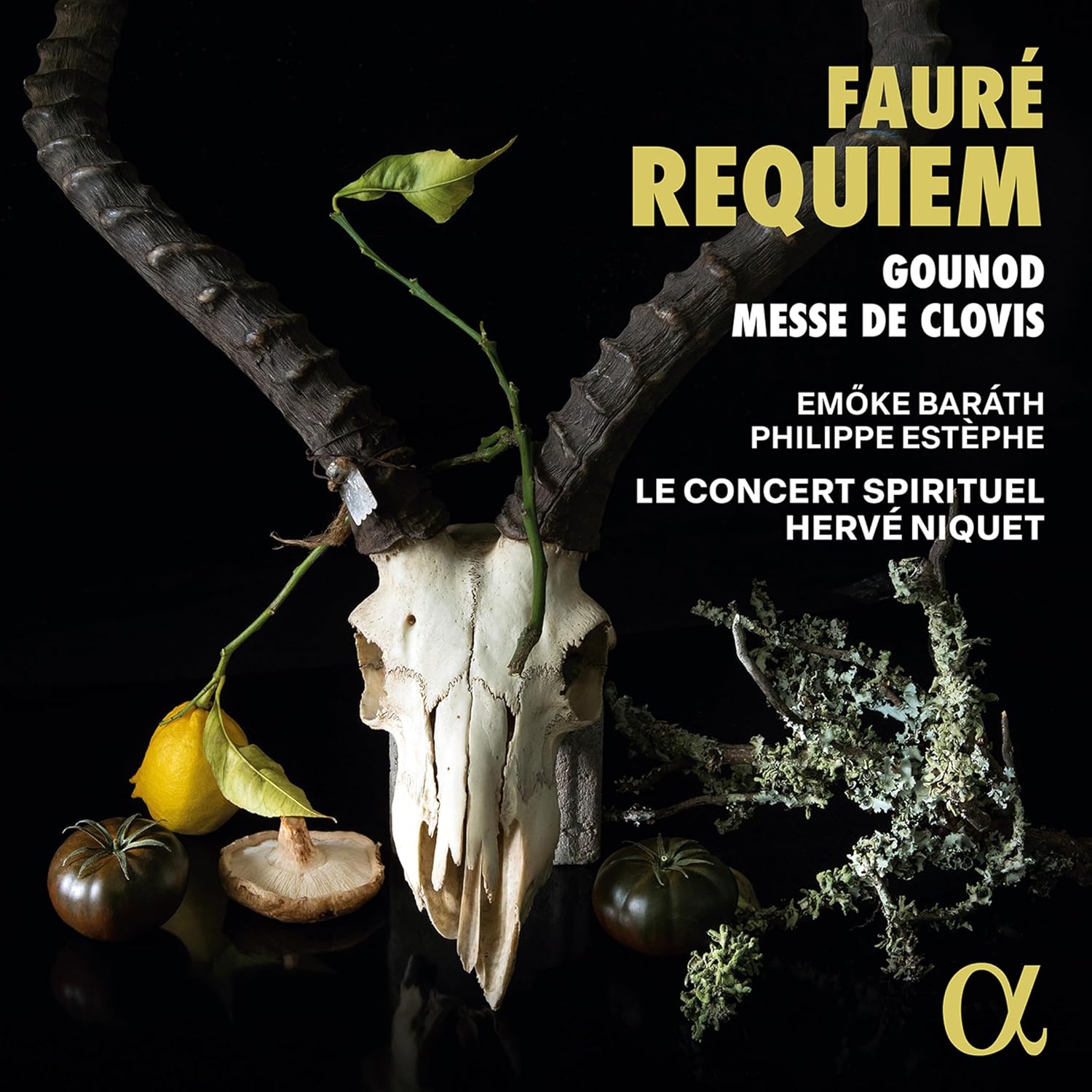 Fauré: Requiem, Gounod: Messe de Clovis Le Concert Spirituel/Hervé Niquet (Alpha-Classics)
Fauré: Requiem, Gounod: Messe de Clovis Le Concert Spirituel/Hervé Niquet (Alpha-Classics)
It was as an avid fan of the short story author Saki that my eye was drawn to the title of Gounod’s Messe de Clovis, although the Clovis here is the 14th century king of France, who became, like Joan of Arc, an emblematic figure for the French people after defeat by Prussia in 1870. Paired with a recording of Fauré’s Requiem, which are ten-a-penny, this seems to be the only available recording of the Gounod, whose music I have become more interested in over the last couple of years. Gounod was very religious and considered a career in the church, but the lure of the opera house proved too strong. But this late work, from 1891, two years before his death, a time when his biggest theatrical hits were long in the past, is a clear statement of his commitment to the French Catholic church, and its musical aesthetic of the time. The booklet liner note says “pure Palestrina and neo-Renaissance from start to finish”, and Gounod himself wrote on the score “in the style of Gregorian chant”. Both are very misleading. It’s actually a mostly homophonic piece for choir and organ that transport you firmly back to a Parisian parish church in the fin-de-siècle.
There are some striking archaisms in the “Credo” and “Gloria” but file this mass under “interesting to know” rather than “revelatory”. In preference, I would recommend Gounod’s cantata Saint Francois d’Assisse, which somehow combines 19th century French opera with Vaughan Williams-like modality and a glistening spirituality. The singing on this present disc, by Le Concert Spirituel, under Hervé Niquet, is scrupulously tasteful, and very French sounding. The tempos in the Gounod are moderate and attempts to dramatise the music only occasional: this is a no-frills liturgical reading. In which respect it is a bit different from the Fauré Requiem that precedes it. Here the tempos often press forward quite noticeably – perhaps trying to blow away the cobwebs from this warhorse? This works well in the “Offertoire” and “Sanctus”, but felt overdone in the middle section of the “Agnus Dei”. I also felt Emóke Baráth’s very polished solo in the “Pie Jesu” sounded too mature and adult – I guess I just prefer a younger-sounding voice in that number. By contrast, Philippe Estéph’s baritone solo in the “Libera me” is so far back in the mix as to barely surface over the orchestra. Perhaps the highlight of this album is the little filler track at the end, an “O Salutaris” by Louis Aubert (1877-1966), with Emóke Baráth here sounding spot on, alongside a poised violin solo by Chouchane Siranossia: it’s lovely. - Bernard Hughes
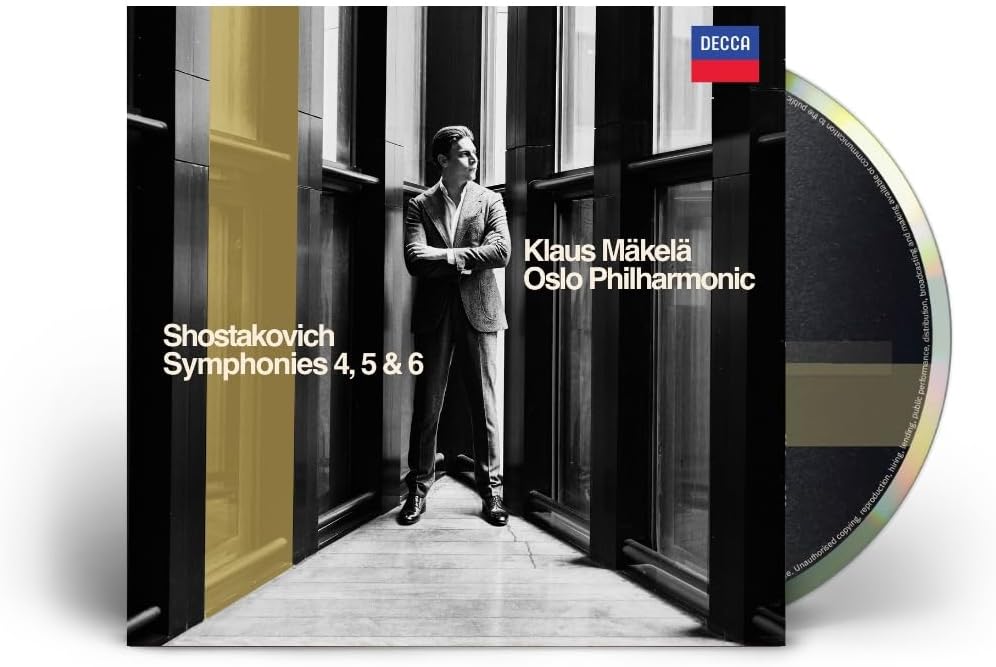 Shostakovich: Symphonies 4, 5 and 6 Oslo Philharmonic/Klaus Mäkelä (Decca)
Shostakovich: Symphonies 4, 5 and 6 Oslo Philharmonic/Klaus Mäkelä (Decca)
Klaus Mäkelä’s Stravinsky ballet recordings with the Orchestre de Paris left me a tad underwhelmed, so it’s good to report that this two-disc Shostakovich set has plenty of whelming moments. Especially Symphony No. 6’s epic first movement, its long, lyrical opening theme perfectly phrased. Mäkelä’s Oslo Philharmonic strings play with an incredible depth of tone, especially the double basses; listen out for the all-important minor thirds tolling out like bells two minutes in. Should Shostakovich’s music sound this luxuriant? Vintage Soviet performances tend to be grittier, but bringing out the Mahlerian influences really works here, and the trumpet-led big climax six minutes in is genuinely hair-raising. Mäkelä describes this music as “perhaps the finest single symphonic movement Shostakovich ever wrote” and it’s hard to disagree. He sustains the tension throughout the long periods of stasis, woodwind soliloquies calling out into the void before a lonely one-note horn solo brings stability, leading to some of the most impassioned and romantic music Shostakovich ever composed. I’ve rarely heard it played with such warmth. The two scherzos which follow are dispatched with rapier wit. Clarinets excel in the “Allegro”, Mäkelä pushing the tempo to breaking point, and the movement’s fadeout is exquisite. The finale is a riot, with some stellar playing from principal bassoon and orchestra leader Elise Båtnes before the crazy coda. What a piece, and what a performance: this is easily a match for Paavo Järvi’s recent Alpha Classics recording.
Mäkelä’s readings of Shostakovich 4 and 5 are also terrific, if less distinctive. He favours flowing speeds in No. 5, the Oslo lower strings really punching out the opening’s dotted rhythms and unison low horns matchless when rasping out the main theme at the start of the development section. Brass and winds really scream, and the parched coda is desolate. The slow movement hits Tchaikovskian heights, and Mäkelä’s tempo for the last movement’s ambivalent payoff feels right. Which leaves Symphony No. 4, a bigger, baggier beast. As with nos. 5 and 6, the playing has ample punch when it’s called for. Shostakovich’s first movement march is really strident here, and the strings’ manic fugato is exhilarating. It’s the shadier, spookier moments which are really telling, like the first movement’s coda (watch out for the tamtam!) and the finale’s funeral march. The symphony’s close terrifies, with ear-splitting brass and one of the most unsettling endings in the repertoire. I needed a quiet sit down after it had finished. Impressive stuff.
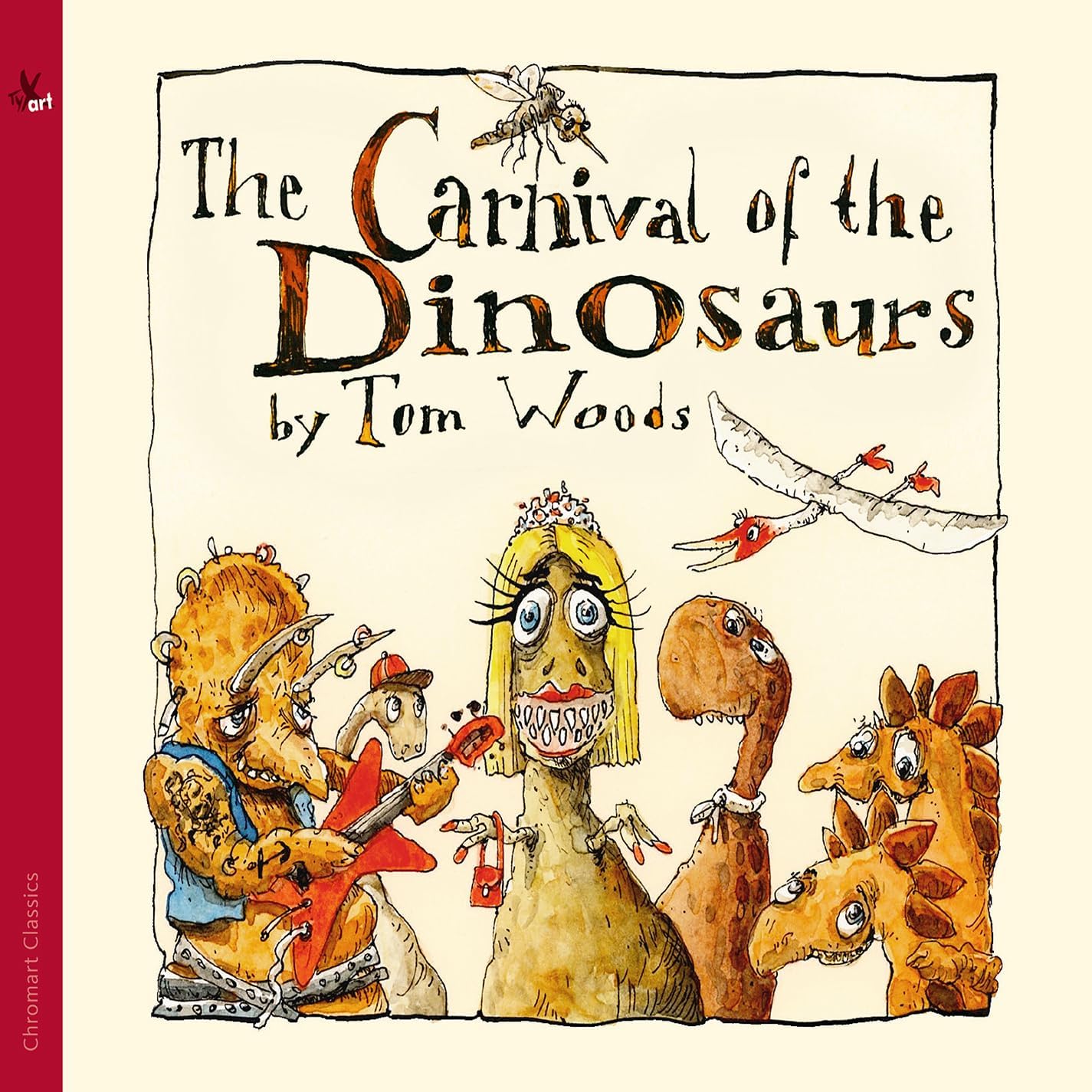 Tom Woods: The Carnival of the Dinosaurs Freddy Kempf, Natalia Woods (pianos), Rachel Teear (narrator) (TYXart Records)
Tom Woods: The Carnival of the Dinosaurs Freddy Kempf, Natalia Woods (pianos), Rachel Teear (narrator) (TYXart Records)
This is a bit of fun: a kind of Peter and the Wolf for narrator and two pianos, telling a composer-penned story about dinosaurs, which turns Tyrannosaurus Rex – the “king tyrant lizard” – into Tyrannosauras Regina – “queen’ – in honour of the composer’s granddaughter. The piece was conceived orchestrally but Covid put paid to that, so this version is a compromise that loses the instrumental colour, but retains the music drama and referential games.
Tom Woods is an Australian opera conductor who lives and works in Regensburg in Germany and the narrator is Rachel Teear, a one-time colleague at Theater Regensburg. Her narration is poised and authoritative, if perhaps lacking a little warmth, but she puts the story over effectively. Pianists Freddy Kempf and Natalia Woods have plenty of notes to contend with, and it does sound idiomatically pianistic, so I would be interested in hearing the original version as a comparison. The playing is virtuosic and beautifully co-ordinated. The music is varied and nods to a number of composers, not least Saint-Saëns’ Carnival of the Animals, an avowed inspiration. But it doesn’t quite have the sparkle of that classic – but then again, what does?
To declare a personal interest, I have myself written three pieces of this type (for narrator and orchestra) so I am very familiar with their challenges. These include balancing speech and music – giving the music room to breathe without losing the momentum of the story, and this Woods pretty much manages. At 40 minutes duration I think he is overestimating the stamina of his potential audiences (aged 7-9 perhaps?). I also fear that the musical style, while admirably not “writing down” perhaps needs more memorable thematic material. And the brief incursions into electronic dance music are a bit icky and didn’t work for me. But I hope the piece finds a live audience, either in this version or the orchestral original, beyond this recording. - Bernard Hughes
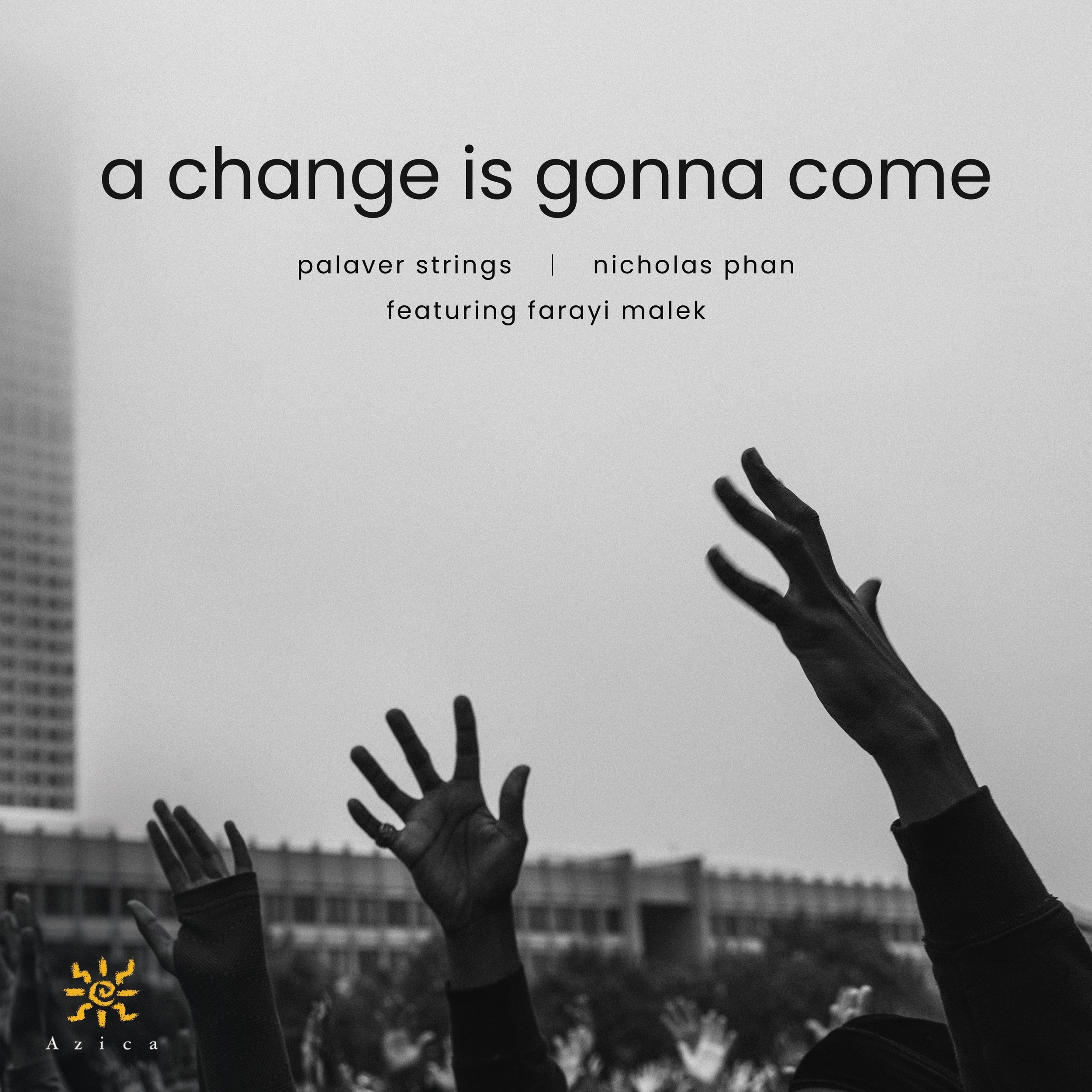 A Change is Gonna Come Nicholas Phan (tenor), Palaver Strings (Azica Records)
A Change is Gonna Come Nicholas Phan (tenor), Palaver Strings (Azica Records)
Here’s an entertaining collection of protest songs, old and new. Having them sung by a tenor and string orchestra is a risky prospect on paper; you worry that the originals will be sanitised beyond recognition. Nicholas Phan and Palaver strings avoid the trap: Domenic Salerni’s arrangements are never saccharine. Take his earthy instrumental cover of Dylan’s “Blowin’ in the Wind”, replete with harmonica effects, or his percussive take on Phil Ochs’ “What Are You Fighting For” with percussive slaps in lower strings. Phan’s clear, lyrical vocals are balm for the ears: try him in Salerni’s witty version of Pete Seeger’s “Where Have All the Flowers Gone”, incorporating snatches of Mahler, Prokofiev and Shostakovich.
The disc contains the premiere recording of Errolyn Wallen’s Protest Songs, commissioned by these performers. They sound like arias in these hands, especially a setting of abolitionist poet Frances Ellen Watkins Harper’s “Song for the People”, Phan really hitting the heights when singing the lines “Our world, so worn and weary/Needs music, pure and strong/To hush the jangle and discords/Of sorrow, pain, and wrong.” We get a spiky extract from Biber’s Battalia à 10 and a haunting arrangement by Jonathan Bingham of “Strange Fruit”. I did a double take when Salerni’s arrangement of Malvina Reynolds’ “It Isn’t Nice” quotes the Curb Your Enthusiasm theme tune, and the album concludes with an exquisite, straight rendition of Sam Cooke’s “A Change is Gonna Come” sung by Farayi Malek. A superb album, beautifully produced.
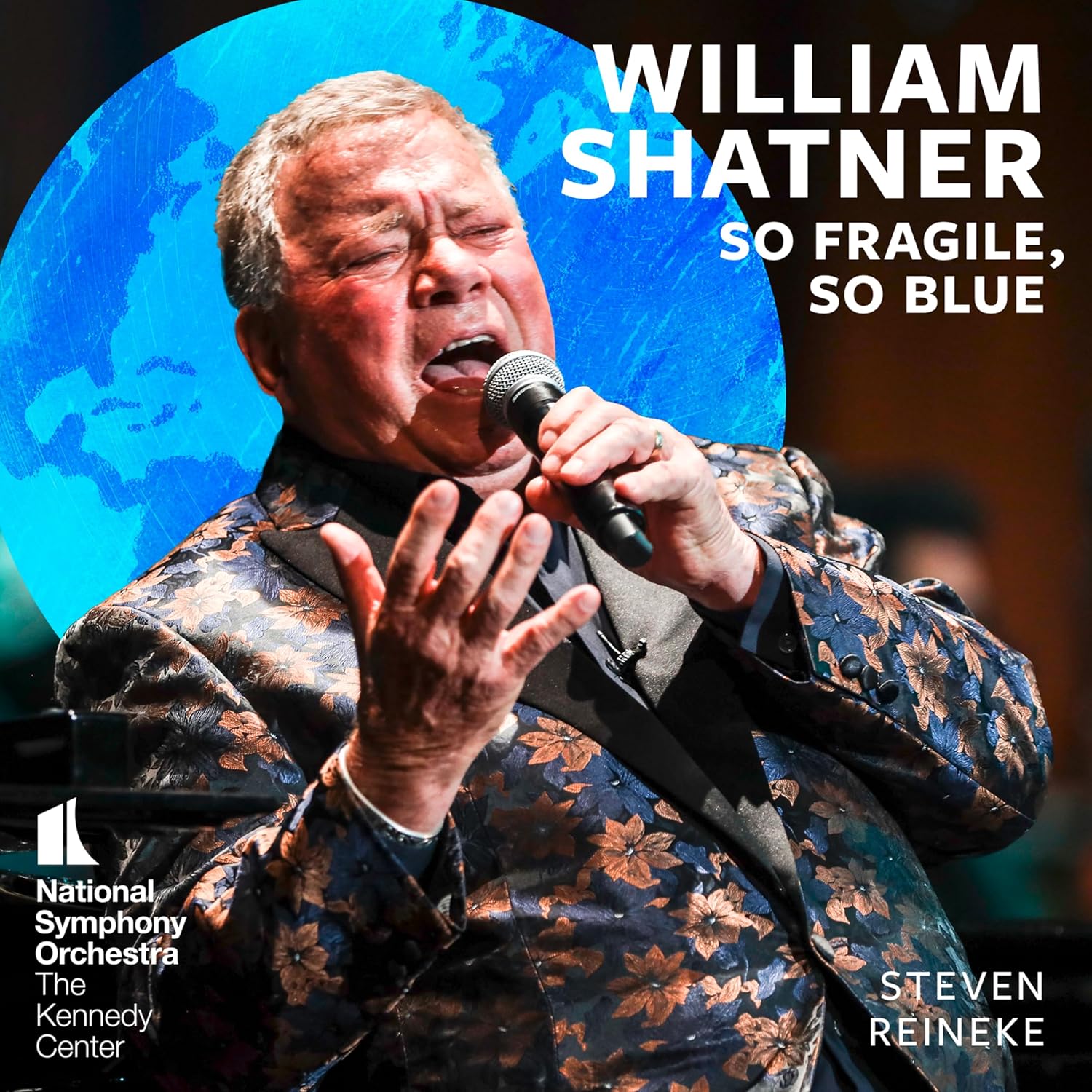 William Shatner: So Fragile, So Blue National Symphony Orchestra/Steven Reineke (NSO)
William Shatner: So Fragile, So Blue National Symphony Orchestra/Steven Reineke (NSO)
Unpicking exactly what So Fragile, So Blue is takes a bit of doing. Here goes: this is a work for speaker and large orchestra composed to celebrate Earth Day in 2022, with spoken-word lyrics by William Shatner and Robert Sharenow set to music by, variously, Jherek Bischoff, Daniel Miller, Gabriel Witcher and Eric Allen, the whole thing coordinated by Ben Folds. That Shatner had just turned 91 when this album was recorded defies belief; listen blind and you’d swear that you were hearing him in his Kirkian prime. And, considering that this is a live performance, Shatner’s timing and delivery are immaculate, his musings touching on matters autobiographical and ecological. “Eight Days on the Water” makes for a strong opener, Shatner looking back at a canoe trip he made as a teenager from Quebec to New York. Lyrics which look prosaic on the page spring to life; hear the words “ice crystal lakes/raging rivers and streams” delivered with this much gusto and it’s hard not to grin. Jherek Bischoff’s cinematic accompaniment complements Shatner instead of competing with him, adding some effective colouristic touches in “The Meaning”.
Subsequent numbers address the permanence of human relationships and the issue of what we leave behind after death (in Shatner’s words, “don’t stick me in an urn… please don’t throw me overboard… cause I want to be a tree”). The finale, “So Fragile, So Blue” was inspired by Shatner’s 2021 trip into space, an experience which left him with feelings of “overwhelming sadness”. Bischkoff quotes Alexander Courage’s famous theme tune, and, the audience giggles when Shatner asks, rhetorically, “How many times did I hear/Space the final frontier/like a punchline or jeer”, before exhorting us to boldly go and admit responsibility for the harm we’re inflicting on the planet. Weighty stuff, but it’s dispatched with a light touch despite the extravagant forces involved. You can hear the twinkle in Shatner’s voice when he bids his audience goodnight after a blazing final chord. Buy this in CD or LP format rather than streaming: both are beautifully produced, with full texts and a selection of entertaining photos.
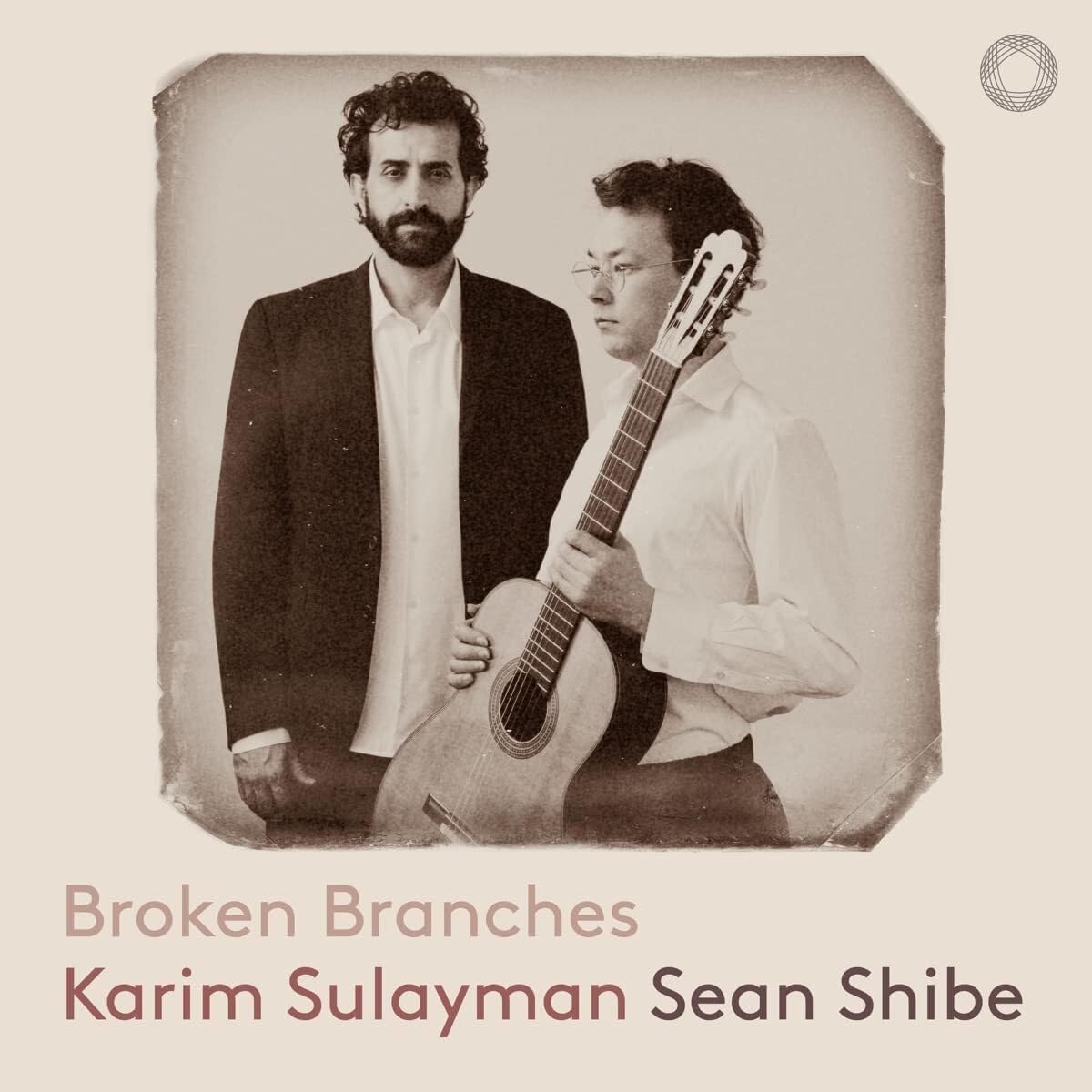 Broken Branches Karim Sulayman (tenor), Sean Shibe (guitar) (Pentatone)
Broken Branches Karim Sulayman (tenor), Sean Shibe (guitar) (Pentatone)
This lovely album features guitarist Sean Shibe accompanying tenor Karim Sulayman, It is a recital focusing on re-contextualised musical fragments from a range of eastern and western traditions remembered, half-remembered and re-constructed by composers from outside those traditions. Shibe says in his liner note that his approach to accompanying some of these songs “infuriates my lute playing friends”. Well, I’m not enough of an expert on these things to comment, but the accompaniments struck me as universally well-judged: tasteful and restrained in places, adventurous and challenging elsewhere.
The Dowland that opens the disc – “Time Stands Still” – is a perfect showcase for Sulayman’s subtle tenor, its earnest storytelling a world away from the more anguished and stylised approach in Monteverdi’s “Si dolce è’l tormento”. Sulayman is first generation Lebanese-American, and his range, with a foot in both camps, is shown in his facility within and beyond the classical mainstream. Apart from Dowland and Monteverdi he embraces traditional Sephardic and Egyptian repertoire, with an approach which is both humble and revelatory.
Shibe is likewise of a mixed heritage – born to an English father and Japanese mother and brought up in Edinburgh – and is aware that his instrument is an outlier, and finding repertoire is an open question in the way it isn’t for, say, a pianist. His solo tracks include Jonathan Harvey’s miniature Sufi Dance and the Arab-Andalusian “Lamma bada yatathanna”, played with verve and directness. Shibe celebrates his own lack of dogma in his approach to both programming and stylistic interpretation, a constant “reframing”. The booklet explains fascinatingly the many connections between the various pieces, but the sequence can be enjoyed on its own terms as a purely musical experience. It all leads up to Britten’s Songs from the Chinese, the first piece the duo performed together, and whose problematic features they don’t shy away from. It is a rich and considered introduction to a piece I didn’t previously know. - Bernard Hughes

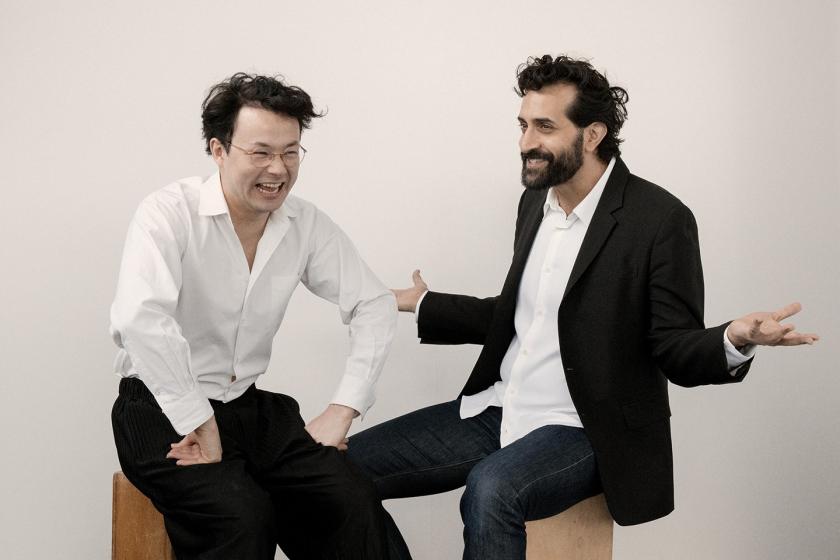












Add comment